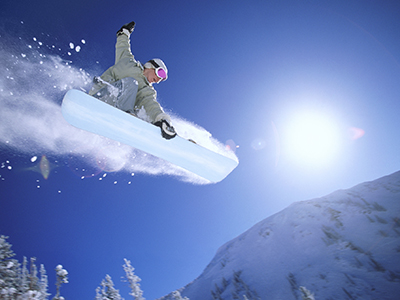
Our skin research expert explains the importance of practicing sun safety throughout the winter season — especially when spending time on the slopes, or if vacationing in a sunny climate.
While many people often associate sunburns with summer heat, there is still a significant risk of sun damage during the colder, cloudier winter months. This can lead to the development of skin cancer as well as premature ageing, in addition to other seasonal concerns such as dry and itchy skin. VCH dermatologist Dr. Harvey Lui shares his recommendations on staying sun safe year-round.
Q: How am I at risk for sun damage in the winter?
A: There is no question that people are still at risk for sun damage during the winter. People generally associate the sun with warmth, particularly during the summer months. This is because the sun emits infrared rays and visible rays that make you feel warm and make everything look bright.
There are also ultraviolet (UV) rays that you cannot see or feel, which include UVA and UVB rays. The risk for sun damage comes from these invisible UV rays rather than the warming infrared rays. When it is sunny in the winter, there is still a lot of UV light that is able to reach your skin. The high energy from those rays is enough to break chemical bonds in your DNA and other skin molecules, which increases your risk of getting skin cancer and premature ageing.
Q: When and where am I most likely to get a sunburn in the winter?
A: The winter season is often associated with outdoor winter sports, such as skiing and snowboarding, which put you at a high altitude. Not only is the light coming from above, but it is also bouncing off the snow below you. In this way, you are getting a double dose of light — and potential risk for sunburns — especially if it is sunny outside.

Time of the day is also an important factor to consider. Because the days are shorter in the winter months, we recommend people be especially mindful between 10am to 2pm on a sunny day.
Q: What are the benefits of sun protection, even during the cloudier months?
A: There is actually a lot of UV light that comes through on a cloudy day even if there is not direct bright sunlight. In addition to wearing sunscreen to protect you from UV rays, wearing protective clothing also helps.
Good winter skin care also includes protecting yourself from cold temperatures and excessive skin dryness by using moisturizer. During the winter months, the humidity in the air drops, leading to water getting pulled out of your skin and into the atmosphere, resulting in dry skin. As your skin gets drier, you can develop microscopic cracks that can lead to itchy skin, eczema and other skin problems.
Sunscreens already have moisturizing ingredients built into them, so if you put on your sunscreen liberally, that acts as a good moisturizer. If you want more, then you can add your favourite moisturizer on top of your sunscreen to deal with winter dryness.
Q: What is the best sunscreen to use in the winter?
A: The best sunscreen to use is the one you are willing to put on your skin! We recommend that you use a sun protector factor (SPF) of at least 30, but preferably as high as 50 or 60. When you apply it, it should be thick enough that you see a bit of whiteness on your skin.
Q: How often should I apply sunscreen?
A: Contrary to what some may think, the SPF number has nothing to do with how long a sunscreen will last. It instead gives us an idea of how effective the product is at filtering out UV rays. For example, if you are using SPF 30, it will take 30 times longer to burn than if you were not using that product.
So long as you are not sweating excessively or washing your sunscreen off, you just need to apply it correctly the first time. Then that sunscreen theoretically should last for the full day.
Q: How do UV rays damage my skin when I am indoors?
A: When you are indoors in artificial light, you should not be exposed to much UV light at all. However, if you are sitting by a window and the sun is on your skin, you can absorb some UV rays. You are not getting as many UVB rays, which are the most damaging; however, there is still some UVA light that comes in.
Q: Why is it so important to educate ourselves on staying sun safe year-round?
A: One reason for staying sun safe has to do with how common it is to get skin cancer. With one in five British Columbians destined to get skin cancer at some point in their lifetime — and 90% of skin cancers being preventable — there are measures you can take and best practices to follow to prevent this from occurring.
Even though you may not be getting as much UV damage during the winter, you should still be aware of your skin. Consult your doctor if you notice a sore that does not heal, or a new spot that looks different from the rest, or a spot that looks irregular. Even though it takes years to develop, skin cancer can show up at any time of the year.



